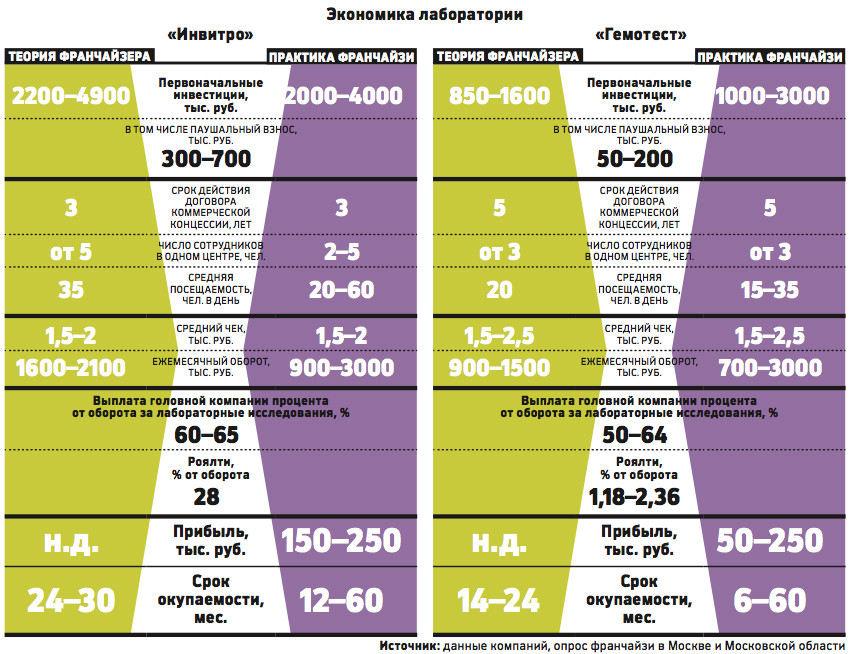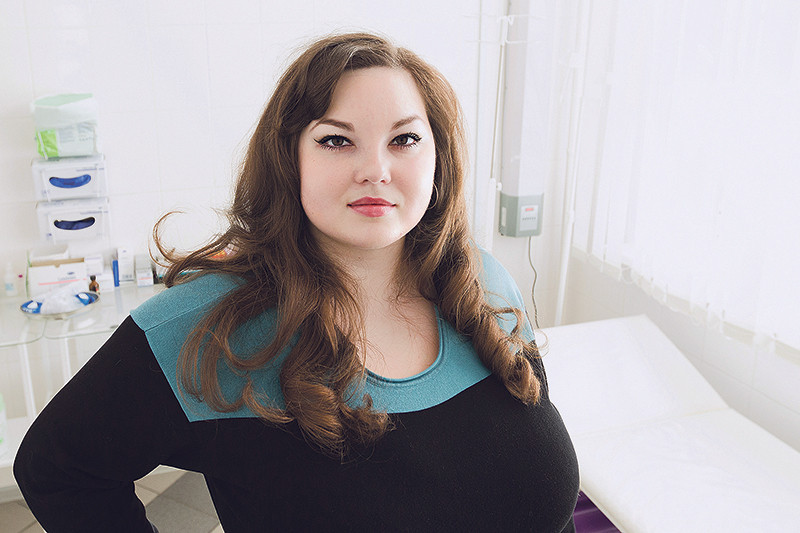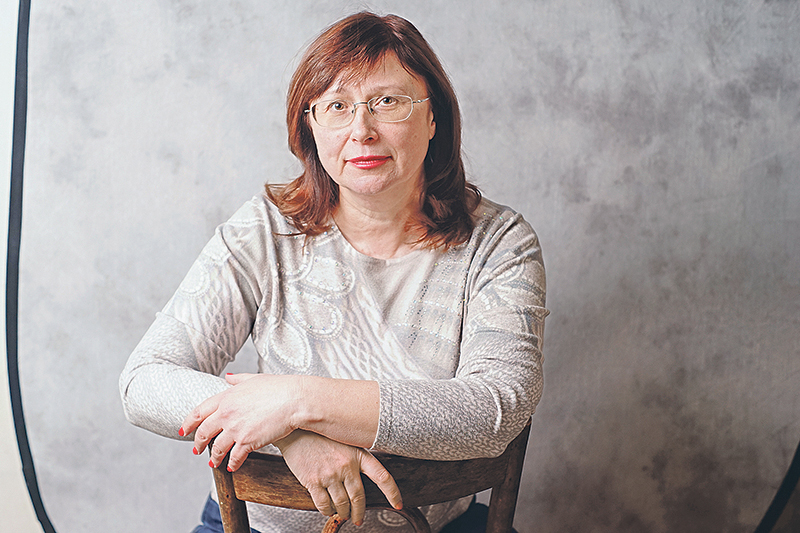Site sections
Editor's Choice:
- Business with China - where to start, how to find suppliers + TOP-15 goods from China and a list of trading platforms
- Where to invest 1000 dollars
- Three common misconceptions and six life tips
- How can maternity capital be used - what needs can be spent on maternity capital
- Caramel apples - a new idea for business
- Ready business plan for beginners
- Gypsum tiles for stone: 7 advantages of the material
- How to buy the best and interesting unusual goods from China for home, gifts and sale on Aliexpress in Russian?
- Business plan for opening a bath
- Where to spend maternity capital before the child is 3 years old
Advertising
| Money on blood: is it worth opening a test collection point for a franchise? |
|
To open a test collection point, a couple of million rubles will be enough, and even less in small towns. Previously, such an item could be recouped in a year. But the competition is growing Laboratory testing is a profitable business. The leader of the Russian market - the company "Invitro" - in 2014 earned almost 1 billion rubles. net profit with revenues of 6.6 billion rubles. Almost half of her income came from the activities of franchisees - independent points of acceptance of analyzes operating under the Invitro brand. Opening such a business is not as difficult as it might seem: the franchise owner provides supplies, provides logistics and even works with doctors to recommend testing at the right place. Those wishing to start their own business in this segment have plenty to choose from: in addition to the Invitro offer, there is a franchise of the Gemotest laboratory and several other networks on the market. But it is more and more difficult to count on quick success every year - the competition is growing. How to start everything The first Invitro franchise was sold in 2005. “Then we had no idea that we would transport biomaterial from 300 cities every day,” recalls Roman Ivanov, director of the retail sales department at Invitro. Today "Invitro" has over 800 medical offices in Russia and the CIS countries and nine of its own laboratories. Franchising program "Gemotest" started in 2010, when "Invitro" already had a fairly large network of offices. Despite this, the new player developed rapidly in those regions where Invitro was widely represented. "Gemotest" took advantage of the fact that "Invitro" restrained competition between its partners, giving priority in opening new points to entrepreneurs already working in the neighborhood. “At first I turned to Invitro, but they refused me in Khimki, and then I decided to open a Gemotest branch there,” recalls Sergei Kazakov, owner of two Gemotest laboratories - in Zelenograd and in Khimki near Moscow. Now "Gemotest" has 309 laboratory departments in 138 cities of Russia and three laboratories for processing analyzes: in Moscow, in Rostov-on-Don and in St. Petersburg. Neither Gemotest nor Invitro require medical education from their partners. Both companies help entrepreneurs start a business from scratch by providing reasonably detailed start-up cost estimates. Each franchisee at Invitro is supervised by a medical administrator who is fully responsible for the medical part of the office, as well as a manager of the franchising department who is already working directly with the investor. “We are open to everyone, but an entrepreneur must work according to the company's strict standards,” says Ivanov from Invitro. "Gemotest" has a similar approach. “It is important that people understand that this business needs to be done,” explains Maria Kuznetsova, Marketing Director of Gemotest. “To think that you have premises, money, opened a branch and forgot about it, is fundamentally wrong.” Neither company helps potential franchisees seek an initial investment. “The task of the franchisee is to find these funds and come to us on their own,” says Ivanov from Invitro. "Gemotest" has a consultant - the company "Master Franchises", which for a fee provides franchisees with legal and accounting support for the business and, if necessary, assists in attracting a loan. How much will the franchise cost The fundamental difference between the two franchises is in cost. The threshold for entering the market through Gemotest is 3-6 times lower than through Invitro: the lump-sum contribution is from 50 thousand rubles. (in cities with a population of less than 50 thousand people) up to 200 thousand rubles. (in Moscow and cities with a population of 500 thousand or more), while Invitro has a minimum threshold of 300 thousand rubles, and it will cost 700 thousand rubles to open an office in Moscow. “Our lump-sum contribution is purely symbolic, we have no goal of making money on it,” says Alexandra Maksimova, head of the Gemotest franchise sales department. Commercial concession agreement in " Invitro "Is for three years, with" Hemotest »- for five years, the lump-sum fee is paid everywhere once upon the conclusion of the contract. Royalty at Invitro »Constitute a fixed amount: 28 thousand rubles. per month, but they begin to pay them at different times: franchisee in Moscow - starting from the fourth month of work, and in the regions - from the third year. V " Gemotest »royalty are tied to turnover: at first they amount to 1.18%, and then - 2.36% of turnover (in cities - millionaires - from the second year, in the rest - from the third). Both companies provide the partner with detailed instructions on starting a business. The exact amount of the initial investment can be determined after the selection and approval of the premises - only then it will become clear how much will have to be invested in the most expensive - repairs and rent. When concluding a contract, Gemotest recruits two nurses for franchisees in Moscow free of charge, and trains three employees from any Russian city free of charge. One of the Invitro franchisees Ksenia Polyakova (Photo: Oleg Yakovlev / RBC) The requirements for the premises of "Invitro" are stricter than those of "Gemotest". “Being on the first line is the key to success,” Ivanov explains. "This is the retail rule: the store around the corner and the store outside are two big differences in revenue." "Gemotest" in this regard is a little less demanding: it is permissible to open a laboratory department in the second line of houses, but on condition that there are, for example, many clinics around, - says Maksimova. "The franchisee will significantly save on rent, while the flow of customers will be no less than on the first line." Maksimova warns that when concluding a lease agreement, franchisees seek rental vacations for a period of up to one and a half months, since a license for medical activities can be obtained only after the office is fully ready for work: can be the most difficult time for a franchisee. " Due to the difference in the size of the lump-sum fee and recommendations for premises, the start-up investment in opening a laboratory under the Gemotest brand is 25-50% lower. Ksenia Polyakova, who has opened five medical offices of Invitro in Moscow since 2010, says that the first point cost her almost 4 million rubles. “Out of inexperience, we bought almost the most expensive furniture,” she tells RBC. - Each next office was already within 2-2.5 million rubles. taking into account the ultrasound apparatus ". In "Gemotest" they claim that opening an office in a city with a population of up to 200 thousand people can cost 0.85-1 million rubles. Both companies strictly regulate practically the activities of their franchisees, including the appearance of employees, the design of a medical office, and the cost of services. “We give recommendations on all aspects of the work - the franchisee only needs to do their part of the work: competently serve the patient, accept him, take the biomaterial and send it to the central laboratory on time, where indicated,” says Ivanov from Invitro. Biomaterial is delivered by car or plane; the franchisor pays for transport. Both Gemotest and Invitro provide partners with consumables both for collection (test tubes, syringes) and for transportation of biomaterial (transport containers and ice packs). Analysis results come in electronic and / or paper form. Franchisees of both companies say it is almost impossible to change prices. But there are also exceptions. “It is unrealistic to change prices in Moscow, but in the regions it is different,” Denis Akimov, who owns more than 20 Invitro outlets in Moscow and Central Russia, told RBC. "If one franchisee occupies the entire region, then it is easier for him to convince the central office." Control and penalties Both companies conduct regular scheduled and unscheduled inspections of franchise branches, as well as use video surveillance systems at the reception and read patient reviews. For those who do not comply with the terms of the contract, penalties are provided: for example, in "Gemotest", if the branch does not open in the morning according to the schedule, the owner faces a fine of 10 thousand rubles. Penalties are also stipulated if the franchisee does not launch the laboratory department within 120 days from the date of signing the contract. In "Gemotest" they emphasize that they are flexible in each situation and that penalties are rarely applied. In "Invitro" strict control over the observance of the terms of the franchise, but in many ways it helps to conduct business, said franchisee in Moscow Ksenia Polyakova. “We are monitored by both mystery shoppers and compliance with standards,” she says. “But it helps me a lot, because, for example, when checking the SES, I can be sure that everything is in order.” Laboratory economics In both companies, the franchisee's revenue is made up of three elements: taking biomaterials, agency fees, and additional services (for example, ultrasound, ECG, doctors' appointments, etc.). Both in "Invitro" and in "Gemotest" taking of biomaterial is paid separately, and this money remains in full with the franchisee. Clients pay separately for the actual analysis in the laboratory. The franchisee collects this money and at the beginning of each month pays most of this amount for the previous month to the parent company, retaining the so-called agency fee. At Invitro, the agency fee is a fixed 35% of the franchisee's revenue for analyzes for Moscow and 40% for the regions. The amount that the franchisee pays for these services to Gemotest increases with the growth of their revenue: from 50% with revenue from research less than 100 thousand rubles. per month up to 36% for revenue above 1.3 million rubles. Additional services, such as ECG or ultrasound, account for about 5-10% of revenue. Marina Logvinenko, one of the Gemotest franchisees (Photo: Oleg Yakovlev / RBC) The number of patients who pass through the department every day is critical to the business. According to Invitro's estimates, the average attendance at their medical office is 35 people, in Gemotest - about 20, but in practice it is extremely difficult to calculate the number of calls in advance. “Gemotest had a point in Kaluga, where every day there were 120 people - there people could not stand it, they tried to open another department as quickly as possible to make it easier to work,” says Kazakov, Zelenograd franchisee of Gemotest. But, according to him, this is rather an exception: there are situations when the attendance does not exceed 15 people per day, which significantly increases the payback period of investments. “The level of state medicine is of great importance: if it offers something worthy, as in Moscow, the attendance will be lower, but in the regions laboratories are often at such a level that people have no choice but to apply for paid services,” - says Kazakov. Both companies help franchisees find their clients: the head offices work with doctors to recommend patients to visit one or another laboratory. Franchisees of both companies say that Invitro is doing this job better than Gemotest. An entrepreneur from Kolomna, who opened a department of "Gemotest" three years ago, complains that the flow of patients from doctors is very low. Because of this, he had to invest a lot in advertising (in the first year - 500 thousand rubles), the separation paid off only three years after its foundation. Zelenograd franchisee Gemotesta Kazakov jokingly says about the “mafia” of “Invitro”: “My point in Zelenograd has low attendance and profitability due to the popularity of competitors from“ Invitro ”in this area.” According to Kontur.Fokus, at the end of 2014, the Zelenograd office had revenues of RUB 3 million. and a net profit of 173 thousand rubles. Kazakov's more successful office in Khimki recouped the investment in six months. “In the regions, we have to invest heavily in advertising,” says Akimov, the Invitro franchisee. “In Moscow and the Moscow region, 90% of people and doctors know the brand, and in the regions there are local players, and Invitro is included as an unknown player, and advertising should be big.” On average, each of Akimov's 20 points returned investments in 2.5 years. The payback period in Moscow and the Moscow region is strongly influenced by competition. “In Moscow now almost every metro station already has one, or even two offices, and if we paid for the first office in two years, then with each next it was already more difficult,” says Polyakova, the Moscow franchisee “Invitro”. According to her estimates, now the new point is unlikely to pay off in less than three years. “The payback period has grown due to the large number of competitors,” agrees the Gemotest franchisee Kazakov. “On average, it takes two years or more, provided that a good location is chosen and residents are willing to pay.” |
| Read: |
|---|
Popular:
Power and energy measurement
|
New
- Tired MPs want to give Russians a two-hour lunch break. Concepts and categories
- Massage covers Relaxation cape
- Relaxation cover Ergopower ERSC7H Contraindications and benefits of massage cover
- How to pay for utilities directly to the resource supplying organization When we pay directly to utility providers
- Recommendations for finding a job abroad for Russians, Ukrainians, Belarusians
- Forgot the code word belagroprombank How to set up a mobile key belagroprombank
- The habits of rich people: behavior, thinking and interesting facts What makes a person rich ask
- Belagroprombank personal account Fransabank internet banking login
- How to make money on agricultural tourism in Russia How to open an agricultural estate in Belarus
- How much is the labor of a kindergarten teacher in our country and in other countries?








